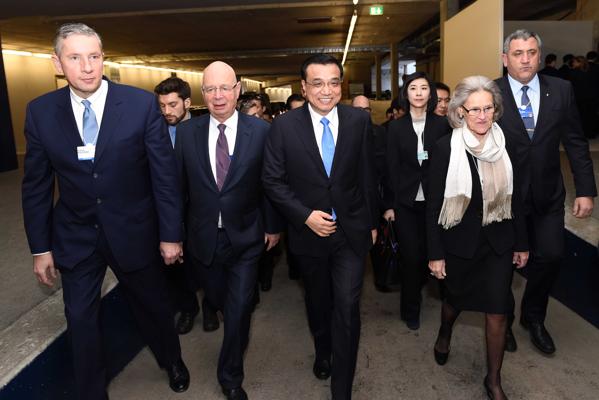
Premier Li Keqiang, flanked by other officials, including Klaus Schwab, founder and executive chairman of the World Economic Forum, enters the meeting venue in Davos, Jan 21, 2015.[Photo/Xinhua]
Speaking in Davos, Premier Li dispels fears of an immediate or systematic burst in property sector
Premier Li Keqiang backed China’s declining real estate sector on Jan 21 and forecast huge potential for the industry in remarks to assure overseas corporate leaders that the country’s door will open wider.
Speaking at a question-and-answer session with members of the International Business Council of the World Economic Forum in Davos, Switzerland, Li dispelled concerns about an immediate or systematic burst in the property market.
But he said the government has seen “certain turbulence” and “signs of decline” in the market’s transaction volume.
“If there is some turbulence, it is only normal adjustment,” Li said. “The potential demand for real estate will remain huge for quite a long time in China, given the large number of rural residents moving to urban areas every year.”
Eighteen million Chinese rural residents have moved to cities in 2014, seeking better living conditions, education and welfare services, pushing the country’s urbanization rate to about 60 percent.
Li ruled out the possibility of an immediate government intervention in the real estate market, saying the government’s priority on housing is to “provide affordable houses to the underprivileged”.
He said the government will increase the supply of affordable homes this year to more than 100 million people who are still living in urban shantytowns.
“That population has manifested that China’s investment demand in the real estate sector is huge, and such demand will be able to gradually offset production overcapacity in the cement and steel industries.”
Li’s remarks on the real estate industry are rare, as he has refrained from commenting on the market.
Heiner Mikosch, a postdoctorate researcher at the KOF Swiss Economic Institute of ETH (the Swiss Federal Institute of Technology) in Zurich, said the biggest challenge to the Chinese economy in 2015 is to prevent a hard landing in the housing market.
Concerns over the possibility of a real estate burst are widespread, as the sector connects directly with key industries such as steel, cement and furniture manufacturing.
Speaking of the priorities for his 2015 reform agenda, Li said cutting red tape, easing restrictions on businesses and moving further into financial reform will be at the top of the list.
A report by an institute under the Chinese Academy of Social Sciences has predicted that housing prices will rise further in 2015 and cities that still restrict multiple-home purchases are expected to scrap the policy to encourage demand.
A property downturn since the start of 2014 had prompted most of the cities that imposed restrictions on home purchases to ease them. There are only five cities where the curbs remain — Beijing, Shanghai, Guangzhou, Shenzhen and Sanya.
Ji Tao, Zhang Chunyan and Liu Jia contributed to this story.
